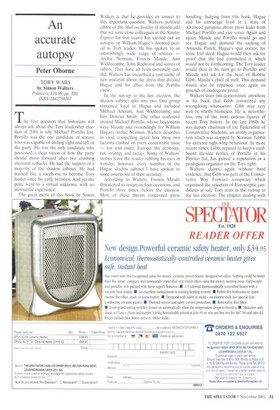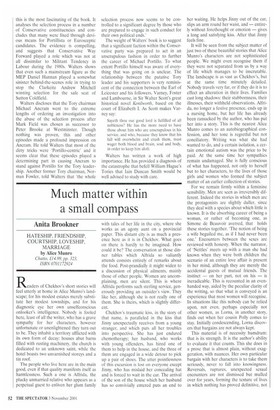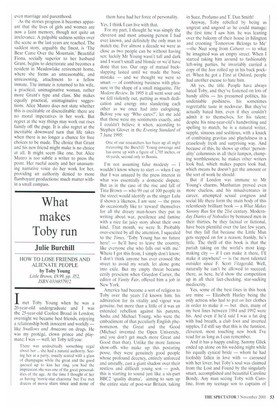An accurate autopsy
Peter Oborne
TORY WARS by Simon Walters Politico's, £10.99, pp. 320, ISBN 1842750267 The first question that historians will always ask about the Tory leadership election of 2001 is why Michael Portillo lost. Portillo was the one candidate of stature who was capable of uniting right and left of the party. He was the only candidate who possessed a clear vision of how the party should move forward after two crushing electoral setbacks. He had the support of a majority of the shadow cabinet. He had trained like a racehorse to become Tory leader since his early twenties. And yet the prize went to a virtual unknown, with no ministerial experience.
The great merit of this book by Simon Walters is that he provides an answer to this important question. Walters, political editor of the Mail on Sunday (I should add that we were close colleagues at the Sunday Express for five years) has carried out an autopsy on William Hague's doomed period as Tory leader, He has spoken to an astonishingly wide range of sources — Archie Norman, Francis Maude, Ann Widdecombe, John Redwood and scores of others. They have all been extremely candid. Walters has unearthed a vast cache of new material about the abyss that divided Hague and his allies from the Portillo circle.
In the run-up to the last election, the shadow cabinet split into two. One group remained loyal to Hague and included Michael Ancram, Ann Widdecombe and lain Duncan Smith. The other coalesced around Michael Portillo, whose lieutenants were Maude and (woundingly for William Hague) Archie Norman. Walters describes in vivid, compelling detail how these two factions clashed on every conceivable issue — law and order, Europe, the economy, tax, strategy and tactics. Some of Walters' stories leave the reader rubbing his eyes in wonder; however, every member of the Hague shadow cabinet I have spoken to since assures me of their accuracy.
According to Walters, Francis Maude threatened to resign on four occasions, and Portillo three times, before the election. Most of these threats concerned press handling. Judging from this book, Hague and his entourage lived in a state of advanced paranoia about press leaks from Michael Portillo and vice versa. Again and again, Maude and Portillo would go and see Hague and demand the sacking of Amanda Platell, Hague's spin doctor, for some foul deed. Hague would then ask for proof that she had committed it, which would not be forthcoming. The Tory leader would then in his turn go to Portillo and Maude and ask for the head of Robbie Gibb. Maude's chief of staff. This demand would also be repulsed, once again on grounds of inadequate proof.
Walters does not demonstrate anywhere in his book that Gibb committed any wrongdoing whatsoever. Gibb may very well be wholly blameless. He is, nevertheless, one of the most curious figures of recent Tory history. In the late 1980s he was deputy chairman of the Federation of Conservative Students, an unruly organisation which was stopped by Norman Tebbit for extreme right-wing behaviour. In more recent times. Gibb, reputed to keep a cardboard life-size replica of Portillo in his Pimlico flat, has gained a reputation as a prodigious organiser on the Tory right.
Walters claims, again without hard evidence, that Gibb was part of the Conservative Way Forward conspiracy which organised the selection of Eurosceptic candidates at safe Tory seats in the run-up to the last election. The chapter dealing with this is the most fascinating of the book. It analyses the selection process in a number of Conservative constituencies and concludes that many were fixed through devious means for Portillista or Eurosceptic candidates. The evidence is compelling, and suggests that Conservative Way Forward played a role which was not at all dissimilar to Militant Tendency in Labour during the 1980s. Walters shows that even such a mainstream figure as the MEP Daniel Hannan played a somewhat sinister behind-the-scenes role in trying to stop the Clarkeite Andrew Mitchell winning selection for the safe seat of Sutton Coldfield.
Walters discloses that the Tory chairman Michael Ancram went to the extreme lengths of ordering an investigation into the abuse of the selection process after Mark Field was chosen as successor to Peter Brooke at Westminster. Though nothing was proven, this and other episodes made a profound impression on Ancram. He told Walters that most of the dirty tricks were 'Portillo-centric' and it seems clear that these episodes played a determining part in causing Ancram to stand against Portillo for the Tory leadership. Another former Tory chairman, Norman Fowler, told Walters that 'the whole selection process now seems to be controlled to a significant degree by those who are prepared to engage in such conduct for their own political ends.'
The weight of Walters' book is to suggest that a significant faction within the Conservative party was prepared to act in an unscrupulous fashion in order to further the career of Michael Portillo. To what extent Portillo himself was aware of everything that was going on is unclear. The relationship between the putative Tory leader and his supporters is very reminiscent of the connection between the Earl of Leicester and his followers, Varney, Foster and Lambourne, in Sir Walter Scott's great historical novel Kenilworth, based on the court of Elizabeth I. As Scott makes Varney say:
Sayeth thou our good lord is fulfilled of all nobleness? He has the more need to have those about him who are unscrupulous in his service, and who, because they know that his fall will overwhelm and crush them, must wager both blood and brain, soul and body, in order to keep him aloft.
Walters has written a work of high importance. He has provided a diagnosis of the catastrophe that befell William Hague's Tories that lain Duncan Smith would be well advised to study with care. her waiting. He helps Jinny out of the car, slips an arm round her waist, and — entirely without forethought or emotion — gives a long and satisfying kiss. After that Jinny feels fine.
It will be seen from the subject matter of just two of these beautiful stories that Alice Munro's characters are not sophisticated people. We might even recognise them if they were not separated from us by a way of life which manages to be inscrutable. The landscape is as vast as Chekhov's, but at the same time minutely detailed. Nobody travels very far, or if they do it is to effect an alteration in their lives. Families cast long shadows: their stubbornness, their illnesses, their withheld observations. Alfrida, no longer a festive presence, ends up in a nursing home, but her life has already been ransacked by the author, who has put her into a story. This is the nearest Alice Munro comes to an autobiographical confession, and her tone is regretful but not conciliatory. Writing was what she had wanted to do, and a certain isolation, a certain emotional autism was the price to be paid. At the same time her sympathies remain undamaged. She is fully conscious of what has happened, not only to herself but to her characters, to the lives of those girls and women who formed the subject matter of an earlier collection of stories.
For we remain firmly within a feminine sensibility. Men are seen as irreversibly different. Indeed the stories in which men are the protagonists are slightly duller, since they deal with a species about which little is known. It is the absorbing career of being a woman, or rather of becoming one, as Simone de Beauvoir averred, that holds these stories together. 'The notion of being a wife beguiled me, as if I had never been one.' Encounters between the sexes are reviewed with honesty. When the narrator. of 'Nettles' meets up with a man she had known when they were both children the scenario of an entire love affair is present in her mind, although they are merely the accidental guests of mutual friends. The instinct — on her part, not on his — is ineradicable. This is recounted in an evenhanded way, aided by the peculiar clarity of the writing, so that what is conveyed is an experience that most women will recognise. In situations like this nobody can be relied upon, not even, perhaps especially not other women, as Lorna, in another story, finds out when her cousin Polly comes to stay. Initially condescending, Lorna discovers that bargains are not always kept.
This material is of necessity humdrum: that is its strength. It is the author's ability to evaluate it that counts. This she does in a prose that is almost plain, without exaggeration, with nuances. Her own particular bargain with her characters is to take them seriously, never to fall into knowingness. Reversals, ruptures, unexpected sexual encounters are not dismissed but mulled over for years, forming the texture of lives in which nothing has proved definitive, not even marriage and parenthood.
As the stories progress it becomes apparent that the lives of girls and women are now a faint memory, though not quite an irrelevance. A palpable sadness settles over the scene as the last years are reached. The saddest story, arguably the finest, is The Bear Came Over the Mountain.' Beautiful Fiona, socially superior to her husband Grant, begins to deteriorate and becomes a resident in Meadowlake retirement home, where she forms an unreasonable, and unreasoning, attachment to a fellow inmate. The inmate is returned to his wife, a practical, unimaginative woman, rather more Grant's type and class. She makes equally practical, unimaginative suggestions. Alice Munro does not state whether this is creditable or discreditable: there are no moral imperatives in her work. But regret at the way things may work out rises faintly off the page. It is also regret at the inevitable downward turn that life takes when there is no longer a chance for free choices to be made. The choice that Grant and his new friend might make is no choice at all. It might seem like one, but Alice Munro is too subtle a writer to press the point. Her rueful acuity and her unassuming narrative voice do her work for her, providing an authority denied to more flamboyant productions: much matter within a small compass.




















































































 Previous page
Previous page